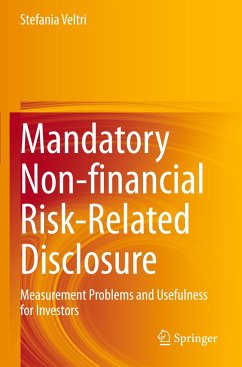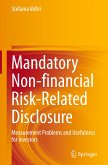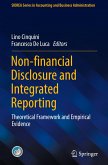This book focuses on the impact of the disclosure of non-financial risk, which could be seen as the most relevant non-financial information (NFI), in the aftermath of the 2014/95/EU Directive. The author analyses whether the switch from voluntary to mandatory NFI enhance the quality of disclosed NF risk-related information and the usefulness of the risk disclosure for investors. The book focuses specifically on the mandatory disclosure of non-financial (NF) risks as required by the EU Directive for listed Italian companies, investigating both the state of art of its disclosure and its usefulness for investors.
In doing so, the book contributes to fill two relevant gaps in risk literature. The first research gap is related to the insufficient investigation of the disclosure of NF risks. Companies mandated to disclose risk-related information focused mainly on financial risks, in spite of the width of the definition of risk, conceived as information about any opportunity, danger,threat, or exposure that has or could impact the company in the future. The second gap is that empirical evidence about the effects of corporate risk disclosures is still limited, and the potential benefits of the disclosure of information on risks have not been fully explored. In particular, the relationship between risk disclosures and firm value is under researched, as the risk literature mainly focuses on the incentives question, related to the motives for which companies decide to disclose.
The research in this book focuses on Italy, a country that provides a unique opportunity to examine the impact of mandatory NF risk disclosure on firm market value, being one of the biggest industrial European countries that had not mandatory legislation for NFI disclosure, and also one of the leading countries in voluntary corporate social responsibility (CSR) reporting at an international level. It has been carried out in the fiscal year 2017, the first year of the application of themandatory NF disclosure for obliged Italian listed PIEs.
The book contributes both to the measurement literature, as it presents a self-constructed quality NF risks and to the value relevance analysis literature, providing evidence of the usefulness of financial and non-financial risk-related disclosures in the Italian context.
In doing so, the book contributes to fill two relevant gaps in risk literature. The first research gap is related to the insufficient investigation of the disclosure of NF risks. Companies mandated to disclose risk-related information focused mainly on financial risks, in spite of the width of the definition of risk, conceived as information about any opportunity, danger,threat, or exposure that has or could impact the company in the future. The second gap is that empirical evidence about the effects of corporate risk disclosures is still limited, and the potential benefits of the disclosure of information on risks have not been fully explored. In particular, the relationship between risk disclosures and firm value is under researched, as the risk literature mainly focuses on the incentives question, related to the motives for which companies decide to disclose.
The research in this book focuses on Italy, a country that provides a unique opportunity to examine the impact of mandatory NF risk disclosure on firm market value, being one of the biggest industrial European countries that had not mandatory legislation for NFI disclosure, and also one of the leading countries in voluntary corporate social responsibility (CSR) reporting at an international level. It has been carried out in the fiscal year 2017, the first year of the application of themandatory NF disclosure for obliged Italian listed PIEs.
The book contributes both to the measurement literature, as it presents a self-constructed quality NF risks and to the value relevance analysis literature, providing evidence of the usefulness of financial and non-financial risk-related disclosures in the Italian context.








